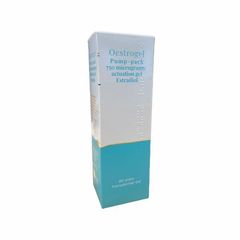Need something else?
We stock over 1102 treatments for 90 conditions

Starting hormone replacement therapy (HRT) can help you feel more like your old self and ease any menopause symptoms you might be experiencing, but it’s natural to have questions about the potential HRT side effects. The good news is they’re usually mild, easily managed and become easier to manage over time.
If you’re considering Oestrogel, or already using it, knowing what the common side effects are and how to deal with them can help you get the most out of your treatment. But always speak to your healthcare professional first about any concerns you may have or symptoms you’re living with. Every woman’s menopause experience is different and it’s finding what works for you that matters.
Key takeaway 1 | Most Oestrogel side effects are mild and improve within three months
Key takeaway 2 | Regular communication with your GP is essential
Key takeaway 3 | Not all women experience the same side effects
Oestrogel is a form of oestrogen-only HRT to help women as they go through the menopause. It contains oestrodiol - a natural form of the female hormone oestrogen. As you enter the menopause, your oestrogen levels will naturally decline and you may experience hot flushes, mood changes and sleep disturbances, among other symptoms. Medicines like Oestrogel replace your missing oestrogen and can relieve your symptoms, but like with any medicine, it’s important to know that you can still experience side effects.
Not every woman who takes Oestrogel will suffer from side effects, but the common ones are:
You may experience more painful periods as your hormones fluctuate, and if you’re not taking progesterone (either as a pill or via the Mirena coil).
Some women may experience irregular bleeding if they still have a womb and Oestrogel isn’t combined with progesterone.
An increase in discharge is not unusual as oestrogen can boost your natural vaginal lubrication
Since this is a hormone-based medication, it’s not unusual to experience changes in your mood and you may suffer from mood swings, irritability or periods of mild depression.
Oestrogen can affect blood vessels and brain chemicals that could result in headaches and migraines.
The effects of starting Oestrogel can be a bit like when you first start puberty, as it can take a while for your body to adjust to your new hormone levels. Most side effects, if they do occur, should ease after two or three months. If you are still struggling with them after this time, speak to your prescriber..
And finally, always ensure you’re applying your Oestrogel exactly as prescribed. Missing doses can confuse the balance of hormones in your body and make your side effects worse.

Serious side effects from Oestrogel are rare, but it’s important to know when to seek medical help. If you notice signs of a severe allergic reaction – like difficulty breathing, a rash or swelling – or unexplained leg pain, chest pain or changes in vision, it’s crucial you contact your doctor or get emergency medical attention right away. These symptoms could indicate something more serious which needs prompt attention.
While most women use Oestrogel without any serious side effects, staying informed about the potential warning signs helps keep you safe. Always trust your instincts and talk to your healthcare professional if something doesn’t feel right.

If you do experience side effects, you can help manage them with a few simple lifestyle tweaks. Focus on small changes, such as following a healthy, balanced diet rich in fresh fruits, vegetables, fish nuts, legumes and wholegrains. Foods containing naturally occurring oestrogens like soya and linseeds may boost your levels and are also good for your heart health.
Try and limit or avoid caffeine and alcohol if you can as these can make hot flushes and other menopause symptoms worse.
Regular exercise, even a daily walk, can have a positive impact on your overall wellbeing, and improve your mood and energy levels. Stress-reducing activities like yoga or meditation can ease discomfort and help you cope with any mood changes.
If your side effects continue despite following these suggestions, speak to your prescribing clinician. Sometimes a small adjustment to your dose is all that’s needed to resolve your symptoms. Remember, they are there to support you, so keep the conversation open.
HRT medications like Oestrogel can be life-changing for women struggling with menopause symptoms but it’s important to think about its use long-term. While the benefits outweigh the risks and can improve your quality of life, studies suggest that there is a slightly increased risk of certain cancers, so attending any routine screening and regular health check appointments and being aware of your own body is very important.
For many women, the benefits of taking HRT outweigh the small risks associated with the treatments they are recommended. Nevertheless, keep the conversation open with your healthcare provider. They will guide you on how long you need to use HRT for and what’s best for your circumstances.
Want to know more about the menopause, symptoms, HRT and long-term use? Take a look at our menopause guides for in-depth information.
It is essential that you speak to a licensed medical professional before starting any menopause medication. They can provide personalised, expert guidance, assess potential risks and ensure that your chosen treatment is safe and suitable for your health needs.
Managing Oestrogel side effects might seem tricky at first, but many women find HRT lets them take control of their menopause symptoms and helps them to feel more like themselves again. Side effects are usually mild and temporary, and with a focus on healthy lifestyle habits, they’ll usually pass quickly. Stay in touch with your healthcare provider who can make adjustments as needed. Everyone’s journey is unique and finding the right balance for you takes time and support.
Ready to learn more about how HRT treatments like Oestrogel could help ease your menopause symptoms? Book your free and confidential menopause consultation today. Our medical experts will talk you through the different options and medications available to help you through menopause before making recommendations to suit your individual needs.
Sources
https://www.bda.uk.com/resource/menopause-diet.html
We stock over 1102 treatments for 90 conditions